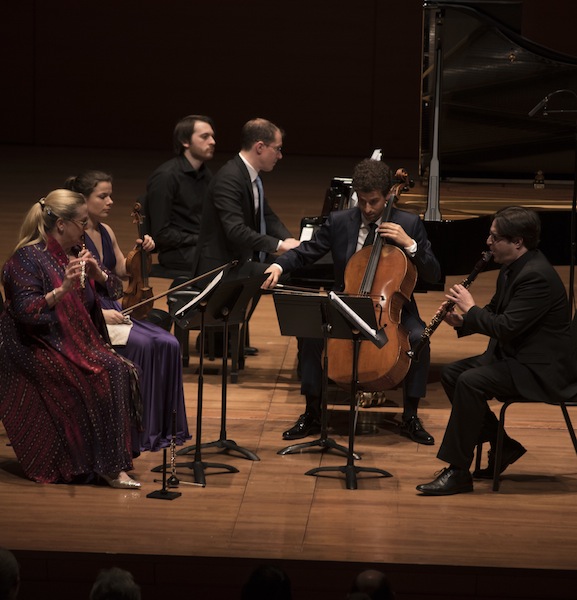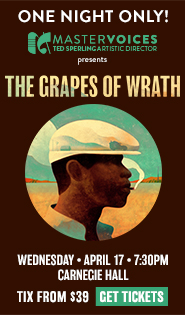Chamber Music Society closes season with simple homegrown pleasures

The Chamber Society of Lincoln Center performed John Harbison’s “Songs America Loves to Sing” Sunday night. (Flutist Tara Helen O’Connor, violinist Bella Hristova, pianist Gilles Vonsattel, cellist Nicholas Canellakis and clarinetist Jose Franch-Ballester) Photo: Tristan Cook
What is America, exactly?
That was the question asked Sunday afternoon by the Chamber Music Society of Lincoln Center in their season ending concert, “America!” As CMS co-artistic director Wu Han pointed out during her introduction, the program was put together two years ago, and the title came afterword.
Still, it’s a question worth thinking about even if it’s insoluble, and the concert went some distance in exploring it through positive and negative examples. This was all music from American composers, though not all the music was “all-American.”
Truly American art music, national in values if not necessarily sound, began with Charles Ives, and all this music came after him: Samuel Barber’s Souvenirs, the Red Violin Caprices by John Corigliano, John Harbison’s Songs America Loves to Sing, William Bolcom’s string quartet arrangements of three of his rags, and the chamber version of Copland’s Appalachian Spring Suite.
Appalachian Spring, coming last, is a certified classic and one of the most significant works of American musical art—so much so that the very sound of it has been intrinsic to creating a clearly nationalist music.
Copland choose to create a kind of Americana. One of the beneficial paradoxes of being an American artist, though, is that one is free of the constraints of blood and language and thus free to pick and choose from any and all traditions— as, in their own ways, did Lou Harrison (music from the Pacific) and Harry Partch (ancient Greece).
Barber’s choice was American, but of a particular time and class. In general he looked over the Atlantic, back to Europe, something like the Henry James of composers. The piano four-hands Souvenirs looks back in time to an America before the advent of mass popular culture; it’s made of dance tunes like the “Two Step” and the “Galop.”
This is probably Barber’s most light-hearted and charming piece, made with typical impeccable craft. Pianists Gilles Vonsattel and Michael Brown played superbly, the opening mark in a concert in which all the performances were at the highest level. There was plenty of energy, which should come easily in parts like the “Scottische,” but the grace of the “Pas du deux” was marvelous.
Bella Hristova played the Red Violin Caprices, from the score for the film The Red Violin–music that has nothing to do with America other than Corigliano’s citizenship. Made to emulate historical European music, the Caprices are technically dazzling and glib, offering all the instrumental challenges of Bach and Paganini with none of the content. Violinist relish the way they get to use the instrument, but even virtuosic performances like Hristova’s can’t invent what’s not there.
Beginning with Harbison’s chamber arrangement of folk songs and hymns, the concert settled satisfyingly into the roots of the best of America. Songs America Loves to Sing is an admirable re-composing and re-contextualizing that keeps the vernacular vocabulary of the originals and puts it into more abstract and objective grammar and syntax, like the dialogue in Deadwood.
Harbison’s imagination illuminates alternate and expanded dimensions of meaning in these songs; turning “We Shall Overcome” into a dignified march, and the “Anniversary Song” into something simultaneously dolorous and determined to step into the future. This was a beautiful performance from the musicians, especially Tara Helen O’Connor’s shining flute and clarinetist Jose Franch-Ballester’s mellow chalumeau register, though all clearly cherished the music.
Just as sincere but less successful was the Escher Quartet’s playing of Bolcom’s arrangements, which included his exquisite Graceful Ghost Rag. The Escher is an excellent quartet and one is used to their superlative performances, but here the approach to the music was too classical, full of arch rhythms and stiff phrases, with no expressive use of tempos. Still their new green instruments, made by a French string maker and painted by a French artist, sounded rich.
Appalachian Spring was gorgeous, deeply captivating from the very first moments. The musicians played sans conductor, and the crisp rhythms were obviously impressive. More so was the unanimity of purpose, the sense of warmth, community, and joy in, yes, simple things. Copland marks the opening of the piece “With simple expression,” and never has that absolute clarity and simplicity held such substance and weight of expression and beauty.
The Chamber Music Society of Lincoln Center’s “Summer Evenings” concert series opens 5 p.m. July 9 with music of Beethoven, Weber, and Schumann. chambermusicsociety.org



